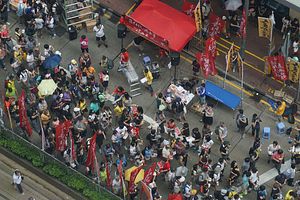Amnesty International has released its Hong Kong Annual Report reviewing the human rights of Hong Kong over the past year. It states that the city’s human rights situation has rapidly deteriorated in recent times and is at its worst levels since the handover back to Chinese rule in 1997.
“Hong Kong’s legal situation is a cause for concern,” the report said. “Hong Kongers’ human rights situation has violations on almost every front.”
The report cited several issues that happened during the course of the year but also some long lingering ones that have been before the courts over the last 12 months.
Media censorship and violence against journalists have once again increased. Local news agency Factwire, which self-raised funds to produce in-depth investigative journalism, received threats and harassment after its investigative report on the recall of defective mainland-made subway train carriages used in Singapore.
There were also instances of police brutality against journalists, in particular when a Ming Pao reporter was beaten by police officers despite presenting credentials while covering a riot against police in Mong Kok in February last year.
“There are escalating cases of violence against reporters and there are very, very confined spaces for press freedom or freedom of expression,” Raees Baig, chairwoman of Amnesty International Hong Kong, said on Wednesday. “If we do not do anything or we do not have any response from the government, we can’t project whether we are going to get worse.”
Self-censorship also became apparent when newcomer broadcaster ViuTV decided not to air an episode of its program that had planned to feature two pro-independence guests. In addition, new media outlets in Hong Kong, especially online-only news portals, are still not recognized by the government, and are refused access to the government press briefings and interviews.
Amnesty also criticized the Hong Kong government and prosecution authorities for the guilty verdicts against the three student leaders of the Umbrella Movement of 2014. Nathan Law, who subsequently became Hong Kong’s youngest-ever legislative councilor, was one of the guilty defendants. The human rights organization said the prosecutions were aimed at shutting down peaceful assembly, as well as indicative of vindictive motives on the government’s part.
“The prosecution of student leaders on vague charges smacks of political payback by the authorities,” said Mabel Au, director of Amnesty International Hong Kong. “The continued persecution of prominent figures of the Umbrella Movement is a blow to freedom of expression and peaceful assembly in Hong Kong.”
The local government has been widely criticized for its lack of response to the five missing Hong Kong-based booksellers, who inexplicitly turned up in the custody of Chinese authorities. The case directly relates to an infringement on Hong Kong citizens’ rights to liberty and security, and the situation clearly demonstrated China’s contempt for due process, as well as Hong Kong’s high degree of autonomy and rule of law. This concept was further extended to Beijing’s intervention in Hong Kong’s Legislative Council oath-taking saga, where controversially, Beijing stepped in to make an interpretation of the city’s Basic Law, a mini constitution of sorts, before the local courts were to make a ruling that would determine the fate of two democratically elected, independence-leaning legislators. An interpretation by the National People’s Congress Standing Committee effectively nullified any independent court ruling, and eliminated the two from the city’s Legislative Council.
Additionally, Amnesty has previously raised concerns over Hong Kong’s legal obligation to protect asylum seekers. Several senior members of the Hong Kong government, including CY Leung, have made statements that suggested withdrawing from the United Nations Convention Against Torture and Other Cruel, Inhuman, or Degrading Treatment or Punishment (UNCAT). In a letter to Leung, Amnesty International said that the withdrawal would be unprecedented and a dangerous step showing complete disregard for international law. The government made the suggestion to circumvent false torture protection claimants in Hong Kong.

































